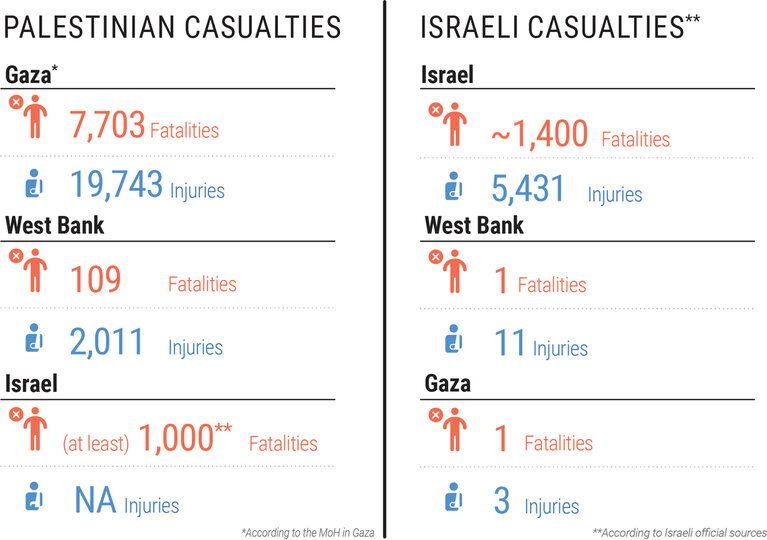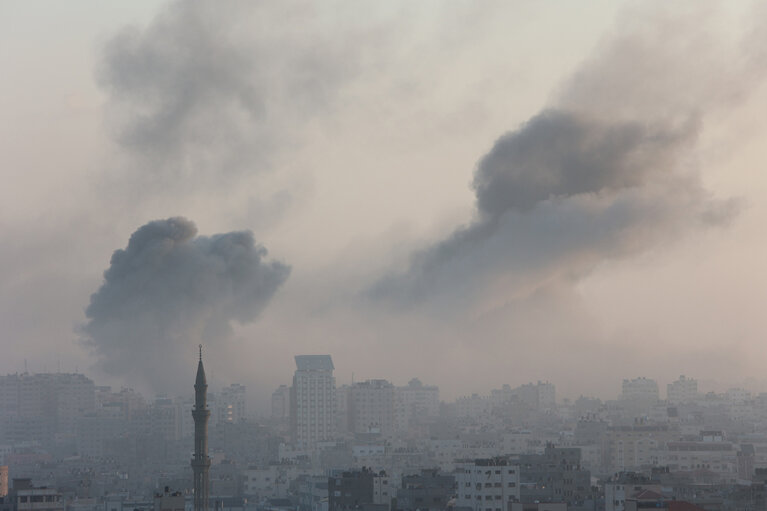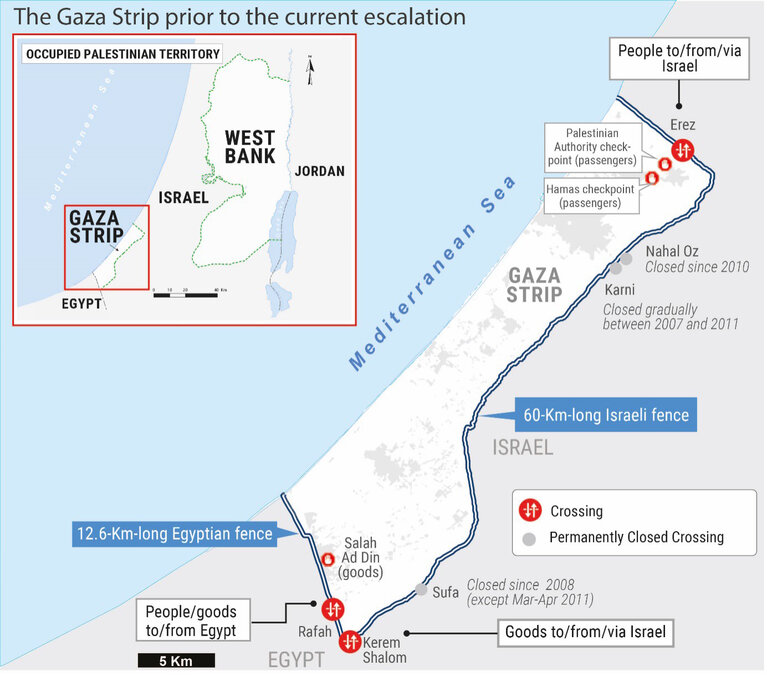Hostilities in the Gaza Strip and Israel | Flash Update #22
KEY POINTS
- Since 27 October at about 18:00, contact with the Gaza Strip has been cut off, following the shutdown of landlines, cellular and internet services. As a result, this Flash Update contains minimal updated information about the humanitarian situation in Gaza over the past 24 hours. For an overview of the situation prior to the disruption, refer to the previous Flash Update.
- The telecommunications shutdown has brought the already challenging delivery of humanitarian assistance to a complete halt and is depriving people of life-saving information. As noted on 28 October by the UN High Commissioner for Human Rights, Volker Türk, “the bombing of the telecommunications infrastructure places the civilian population in grave danger. Ambulances and civil defence teams are no longer able to locate the injured, or the thousands of people estimated to be still under the rubble. Civilians are no longer able to receive updated information on where they can access humanitarian relief and where they may be in less danger.”
- Fragmented information available indicates that the past 24 hours (as of 21:00 on 28 October) have witnessed the most intense Israeli airstrikes and artillery shelling since the start of the hostilities. Additionally, Israeli infantry and armored vehicles entered various areas within Gaza and clashed with Palestinian armed groups.
- The Ministry of Health (MoH) in Gaza reported that between 27 October, 18:00, and 28 October around noon time, at least 377 Palestinians, including 157 children, had been killed in Gaza. This brings the cumulative reported fatality toll in Gaza since the start of hostilities to 7,703, of whom nearly 66 per cent are reportedly children and women.
- As of 27 October, an estimated 1.4 million people in Gaza were internally displaced, with some 657,000 sheltering in 150 UNRWA facilities. The average number of internally displaced persons (IDPs) per shelter was almost three times their intended capacity. Forty-two UNRWA installations, including several shelters, have been damaged during the hostilities resulting in 13 fatalities and 195 injuries among IDPs.
- The complete siege of Gaza imposed by Israel continues, as all crossings have remained closed. Since 21 October, 84 trucks carrying water, food, and medical supplies have entered Gaza via the Rafah crossing with Egypt; entry of desperately needed fuel remains banned by the Israeli authorities.
- Palestinian armed groups’ indiscriminate rocket firing towards Israeli population intensified over the past 24 hours, with no fatalities reported. Overall, about 1,400 Israelis and foreign nationals have been killed in Israel, according to the Israeli authorities, the vast majority on 7 October.
- According to the Israeli authorities, 230 people are held captive in Gaza, including Israelis and foreign nationals. Media reports indicated that about 30 of the hostages are children. Four hostages were released on 20 and 23 October. On 26 October, Hamas claimed that 50 of the hostages had been killed by Israeli airstrikes.
- On 27 October, the United Nations General Assembly adopted a resolution calling for an “immediate, durable and sustained humanitarian truce,” the release “of all civilians who are illegally being held captive,” the protection of international institutions, and ensuring the safe passage of humanitarian aid into the Gaza Strip.
- In the West Bank, since the afternoon of 27 October (as of 21:00 on 2 October), one Palestinian man was killed by an Israeli settler. This brings the total number of Palestinian fatalities by Israeli forces or settlers since 7 October to 109, including 33 children. Of these fatalities, 102 were killed by Israeli forces and seven by Israeli settlers. One member of Israeli forces was killed by Palestinians.
- As of 27 October, Member States have pledged nearly US$108 million in support of the inter-agency Flash Appeal launched on 12 October by the OPT Humanitarian Country Team. This represents about 37 per cent of the initial estimated requirement when the Appeal was launched. Private donations to the OPT Humanitarian Fund can be provided online.
West Bank Humanitarian Overview
Casualties
In the West Bank, between the afternoon of 27 October and 21:00 on 28 October, one Palestinian man was killed by an Israeli settler (see details below). No Palestinian fatalities by Israeli forces have been recorded during this time. Additionally, a 19-year-old Palestinian man succumbed to previous injuries allegedly caused by Palestinian Security forces during confrontations that erupted in the context of demonstrations in solidarity with Gaza on 18 October.
Almost 50 per cent of the 109 Palestinian who were killed by Israelis in the West Bank since 7 October were hit during confrontations that followed Israeli search-and-arrest operations; about 40 per cent in the context of demonstrations in solidarity with Gaza; and most of the remaining 10 per cent during attacks and alleged attacks by Palestinians against Israeli forces or settlers, and in settler attacks against Palestinians.
Since 7 October, Israeli forces and settlers have injured 2,011 Palestinians, including at least 180 children. Some 27 per cent of the injuries have been caused by live ammunition. The number of Palestinian injuries from live ammunition is almost eight times higher than the average of such injuries between 1 January and 6 October 2023.
Settler-related Violence
On 28 October, in As Sawiya village (Nablus), a group of Israeli settlers threw stones and opened live fire at Palestinians who were harvesting their olive trees. As a result, one Palestinian man was killed. This brings the total number of Palestinians killed by settlers since 7 October to seven, including one child, accounting for half of all Palestinian fatalities by settlers in the West Bank so far in 2023 (14).
October marks the beginning of the olive harvest season. To access olive groves located within or nearby Israeli settlements, or in the closed military area behind the Barrier (the “Seam Zone”), Palestinian farmers must obtain permits or permissions from the Israeli authorities. However, since 7 October, these procedures have been halted, rendering large areas inaccessible or accessible at risk of facing settler attacks. Consequently, some families risk losing their income for the entire year.
Since the start of the current olive harvest season, at least 32 incidents of settler violence, in addition to harassment of Palestinians harvesting their olive trees, have been recorded, resulting in one fatality and 27 injuries, either by settlers or by Israeli forces who intervened following settler attacks.
The already high level of Israeli settler violence recorded during the first nine months of 2023 has sharply increased since the escalation of hostilities. Since 7 October, OCHA has recorded 154 settler attacks against Palestinians, resulting in Palestinian casualties (23 incidents), damage to Palestinian property (105 incidents), or both casualties and damage to property (26 incidents). This reflects a daily average of seven incidents, compared with three since the beginning of the year.
More than one-third of the incidents involved threats with firearms, including shooting, by settlers. Almost half of all incidents involved Israeli forces accompanying or actively supporting Israeli settlers while carrying out the attacks. Many of the latter incidents were followed by confrontations between Israeli forces and Palestinians, where three Palestinians were killed, and dozens injured. Affected properties included 24 residential structures, 40 agricultural/animal-related structures, 68 vehicles and more than 650 trees and saplings.
Access Restrictions
In addition to the access restrictions affecting farmers, since 7 October, the Israeli authorities have imposed multiple additional restrictions across the West Bank, including East Jerusalem. This has been done either by closing road gates, erecting flying checkpoints at main road junctions, creating earth mounds or placing concrete roadblocks. These measures have been accompanied by the deployment of significant military personnel. Some movement obstacles have been erected by Israeli settlers.
These restrictions have been particularly severe in areas near Israeli settlements, in areas behind the Barrier, and in the Israeli-controlled part of Hebron city (H2), further isolating Palestinian communities and severely limiting their access to essential services.
Displacement
On 28 October, Israeli forces demolished a three-story residential building in Area C, next to Al Jalazun refugee camp (Ramallah) on grounds of lack of Israeli building permits, displacing three families (12 people, including five children). Since 7 October, 65 Palestinians have been displaced following similar demolitions in Area C and East Jerusalem, and another 20 following punitive demolitions, targeting the family homes of perpetrators and alleged perpetrators of fatal attacks against Israelis.
In addition, there has been an increase in the displacement of Palestinians amid settler violence and access restrictions. Since 7 October, at least 82 households comprising 607 people, including 211 children, have been displaced in this context. The displaced households are from more than 13 herding/Bedouin communities.
One such incident occurred on 12 October when eight households, comprising 51 people, were displaced from Shihda Wa-Hamlan herding community in Nablus, after armed settlers threatened them at gunpoint, warning that they would be killed and that their tents would be set on fire during the night. One of the family members, 52-year-old Abu Ismail, stated:
“I had no choice but to leave everything behind to protect my children."
Attacks on health care
Since 7 October, WHO has documented 118 attacks on health care in the West Bank affecting 99 ambulances and including 67 attacks involving obstruction to delivery of health care; 61 involving physical violence towards health teams; 19 involving detention of health staff and ambulances; and 12 involving militarized search of health assets.
For the latest available information on humanitarian needs and responses see the previous Flash Update.












